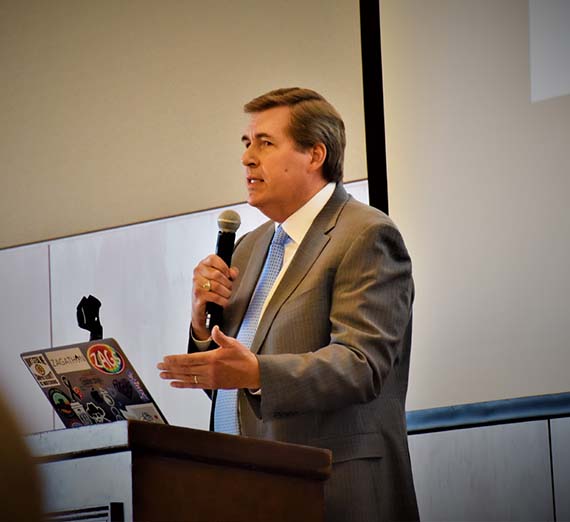An Ethic of Care, a Vision for Advancement

President Thayne McCulloh addressed faculty and staff on Sept. 13 with a variety of important topics, starting with a story poignantly demonstrating Gonzaga’s culture.
Fifty-three years ago this fall, McCulloh shared, there was a student who had a great first year at Gonzaga. After the individual’s trip home, an accident left them paralyzed. Faculty, staff and Jesuits reached out to provide encouragement and hope to the student and family. This year, that person died, and left the University a significant financial gift. This individual had only been at GU one year, but the care received was remembered for more than five decades.
“The way we rally when something traumatic affects people in our community – the way we demonstrate our care, coming together when we see people in need – that is a way I know us as a Jesuit, Catholic university,” McCulloh said. “The ways in which we are with each other and with students does in fact have long-term impact.”
Higher Ed in the U.S.
McCulloh also shared his irritation about the ways higher education in the U.S. is so frequently portrayed as failing (in the press). Referencing a federal budget that reflects incredible imbalances, McCulloh says that, as a nation, “we’ve done a horrible job at getting our priorities straight.” Our nation’s infrastructure and health care systems are also underfunded. Forty million people live in poverty and our country needs to train 1.4 million people to be nurses. And higher education too is no longer adequately funded.
“Higher ed is here to solve problems,” McCulloh said. “Many of the most important advances have been developed at universities in partnership with industries. Universities are also a forum for addressing issues that relate to the human condition. When we build a learning environment, we build a connection, and the promise of new students who become part of the ecosystem of the economy. Our grads are becoming educators, responding to issues of homelessness, advocating in the legal system.”
He continued: “Everyone who comes here as a 17- or 18-year-old still has a lot of growing to do. It’s amazing how much growth occurs during the college experience, and that’s the product of millions of interactions they’re having with faculty and staff and their peers. They change for the better because we fundamentally believe in respect and human dignity and our responsibility to one another.”
“Universities represent a threat to totalitarian regimes,” he noted, referencing the Jesuit university in Nicaragua recently overthrown by its government. “We are ultimately about the search for truth and the freedom to pursue that truth – and that’s significant as we see major entities trying to suppress this freedom.”
McCulloh believes it’s imperative that higher ed institutions figure out how to evolve, be more responsive to challenges, preserve the things that we do well and change what needs to change. And, like most other institutions, Gonzaga needs to embrace this challenge alongside addressing a challenging economic context.
Financial Realities
The long-term financial effects of COVID, widespread inflation, a nationwide drop in philanthropic giving and a demographic decline in students graduating from high school resulted in decreased revenue, McCulloh said. Fortunately, Gonzaga put into place some intentional programs in the last few years to help us serve more students, and those are bearing fruit in the way of net revenue and scholarship support.
The most significant impact on our budget currently is the economy, the president said. The same strain we all feel in our personal budgets due to inflation has created the need for the University to re-balance its expenses in light of available revenues, with a current year target of $8.5 million.
“We’re looking at ways to address the imbalance through a combination of expense reduction and revenue generation,” McCulloh said, “and in a manner that will have the least possible harmful impact on people.”
Despite the budget reality, senior leaders agreed to proceed with an annual compensation increase for employees.
“We want to continue to be a place where people say, ‘yes, this level of compensation is still workable, it feels like it’s doable’,” McCulloh added.
When asked how else we can support our teams in challenging times, the president said there may be opportunities to consider job sharing or more flexibility around work, to help prevent burnout.
Strategic Planning
The Grand Challenge, which so many faculty and staff participated in over the last year to identify key strategies for moving the University forward, has set us up for growth and creative solutions to pressing issues. That same strategic plan is guiding the development of our next major fundraising effort, which is already in the planning stages.
Here are some of the priorities McCulloh listed:
- Continue to refine and develop high demand learning opportunities
- Develop and launch the School of Health Sciences
- Plan for the Institute for Informatics and Applied Technology
- Discern athletic programs in light of NCAA evolution
- Continue revising compensation practices
- Play a key role in the technology manufacturing hub
- Prepare for phase two construction of new undergraduate housing along Sharp Avenue
- Support a successful institutional accreditation mid-cycle review (Spring 2024)
Aggressive Advancement
Our faculty, staff and administration, over the past year, have been actively involved in refining and revising programs.
“The aggressiveness of advancing the strategic plan is entirely about developing opportunities for students and maintaining the profile of Gonzaga as a healthy, vibrant, creative community, because both things matter,” said McCulloh.
